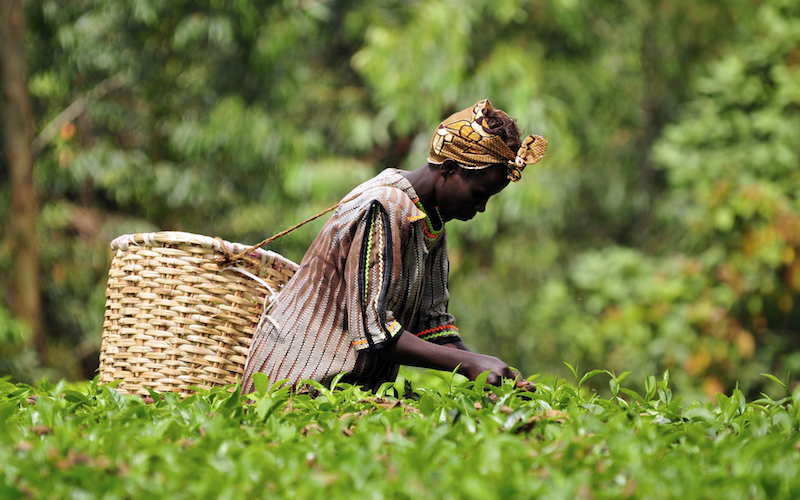
Optimizing African Food Systems
In Africa, agriculture is not only a source of food and nutrition but of incomes, employing up to 64 percent of labor on the continent with women producing up to 80 percent of food. It is therefore the most accessible sector. Investments to enhance productivity in this sector will ensure not only food security but also inclusive growth, opportunity and poverty reduction.
The World Bank reports that in Africa, a 10 percent increase in crop yields translates to approximately a 7 percent reduction in poverty. Growth in agriculture is 2-4 times more effective in reducing poverty than is any other sector. Consequently, in Africa, investment to enhance productivity in this sector using Ecosystems Based Adaptation approaches (EBA) could potentially result in achievement of SDGs 1, 2, 5, 8, 9, 13, and 15. Globally, the food and agriculture industry represents a massive component of the global economy. It represents approx. 10 percent of global GDP, representing approx. $70 trillion, and 70 percent of the world’s poorest families are employed in agriculture. Considering that hungry people cannot be productive in any sector, the achievement of the SDGs are hinged on a productive agriculture and food security sector
Optimizing the agro-value chain
With the right approaches that work with nature, efforts to optimize the agro-value chain in Africa can result in not only food security but also cross-cutting benefits, including a healthy environment, healthy people and poverty reduction. Studies show that optimizing food production through embracing ecosystems based approaches that work with nature can result in yield increases of 116 – 128 percent and accompanying farmer income increases as well as enhanced capacity of ecosystems that underpin healthy environments. Studies further show that forward and backward linkages of these ecological approaches to demand and supply side value chains and value addition activities such as access to lucrative markets, supply of technologies etc. can create additional income opportunities and as many as 17 million jobs for youth on the continent.
Value chain services and activities e.g. processing, storage, transportation, etc. will also boost food security and income savings by cutting post-harvest losses that cost the continent up to $4 billion annually in lost food. This is enough food to make an additional 48 million people food secure without increasing production.
Furthermore, it has been scientifically proven that ecologically produced foods are more nutritious because immune-system boosting compounds are more prevalent in ecologically grown crops than conventionally produced crops. Consequently, optimizing the agriculture sector for food security in Africa through embracing EBA-driven agriculture approaches can contribute to cross-cutting benefits – including food and nutritional security contributing to improved immunity and hence health of communities. It also contributes to income and wealth creation hence poverty reduction and improved ecosystems hence healthy environments.
Food systems for a healthy Africa
While the agriculture sector is highly potent in achieving the SDGs and ensuring a healthy and prosperous Africa, this postulation is not pre-ordained neither can it be achieved in isolation. A number of enablers to this optimization, including policies, institutions, investments and markets have to be addressed to unleash this latent potential in the agro-sector. Among areas to be prioritized are as follows:
Influence pro-women empowerment policies: Women account for up to 80 percent of food production and empowering them through relevant policies such as affirmative action in accessing factors of production such as land, financing, technology, extension and training services etc. will go a long way to enhance agro-productivity in Africa. Appropriate affirmative action policies are called for in the AU Agenda 2063 as a potent strategy in enhancing agro-productivity in Africa.
Invest in partnerships for implementation: In Africa, the biggest problem is not in generating ideas but in implementing them and this is the case because partnerships needed to ensure implementation are usually not prioritized and fostered. This is set to change with the Ecosystems Based Adaptation for Food Security Assembly (EBAFOSA), a pan-African policy framework and implementation platform founded under the auspices of UNEP and the AU.
EBAFOSA is providing a policy and implementation platform, a solutions space fostering partnerships to blend the strengths of governments, the private sector, non-profits, academia, research and individuals among others to build mutually beneficial partnerships toward achieving implementation. Its mandate seeks to enhance productivity by ensuring proven EBA-driven agriculture approaches and value chains are effectively up-scaled into policy and implementation throughout the continent through country driven processes.
Influence policies to ensure countries invest in rural infrastructure, especially transport and rural electrification through off-grid renewable energy: 70 percent of Africa’s population is rural and engaged in agriculture. While this is the case, less than 50 percent can access adequate roads and only 1 – 8 percent are connected to the grid. Reliable transportation in rural areas is critical in connecting farmers to markets and cutting post-harvest losses currently accounting for as much as $48 billion annually thus enhancing agro-productivity. In addition, considering that up to 70 percent of SSA population resides in rural towns and villages, investment in rural roads as opposed to highways will have a higher cost-benefit ratio. Beyond transport infrastructure, rural electrification, especially through off-grid solutions which are cost-effective in rural market context will catalyze the development of rural value adding agro-industries thus enhance rural economies. Collectively this cuts wastes, enhances productivity of the agriculture sector, improves earnings and hence health and welfare of the majority on the continent.
De-risk lending in agriculture in general: Most commercial banks consider lending to agro-sector high risk and are therefore averse to this sector or peg very high interest rates. This greatly hampers productivity through limiting private sector engagement. Governments, working with the private sector and the development partners can come up with appropriate de-risking tools e.g. providing integrated financial security deposited with commercial banks tied to capacity building and farmers using low-risk EBA approaches to enhance chances of successful yields. Commercial loans can be issued to farmers who certify these requirements, including women farmers at low / affordable interest rates considering the 3-pronged de-risking tool – security deposited by governments; training and capacity building offered by development partners; Low risk EBA approaches used by farmers
Influence Africa trade policy reforms to ensure they promote intra-regional trade: Intra-Africa, trade is the lowest in the world at 12 percent compared to 25 percent in South East Asia, 65 percent in Western Europe and 45 percent in North America. Enhancing intra-African trade can earn Africa an extra $20 billion annually hence enhance agro-productivity. In addition, the African Development Bank observes that Africa is one of the regions in the world with the highest visa requirements. This restricts movement of people who would otherwise facilitate enhanced trade, job creation and even technology transfer through peer-to-peer learning of accessible productivity enhancing technologies. For instance, the zai water harvesting technology known to increase yields by 50 – 100 percent in the Sahel. Other regions across Africa, like the East Africa regions some of which suffer similarly dry conditions like the Sahel could benefit from peer-to-peer learning if there was freer movement of people across the continent. These restrictions therefore imply missed opportunities to enhance productivity.
Push for the full liberalization of Africa’s air space to enhance regional & international trade: With African open skies, aviation represents an authentic tool for growing domestic and international trade, including trade in agriculture through fast and affordable transportation. This will enhance productivity through enhancing competitive markets. Transport costs are 63 percent higher in Africa than in developed countries, and expanding intra-regional air-connectivity will consolidate the continents markets, reduce trading costs and improve competitiveness of Africa’s produce in local and international markets.
Break institutional silos in decision making: The enablers of an optimized agriculture sector cut across a number of institutions and government ministries. For instance, a decision to prioritize investment in rural infrastructure to enable agro productivity may take coordination between the agriculture ministry, energy ministry, transport & infrastructure ministry, rural development ministry, industrialization ministry, lands ministry and the finance ministry to ensure adequate budgetary allocation to implement policy decisions. Initiatives such as the Ecosystem based Adaptation for Food Security Assembly (EBAFOSA) platform seeks to break such silos and facilitate seamless interaction between these decision makers to ensure formulation of requisite policies. It also goes further to pull in the private sector to facilitate effective and efficient implementation of policy. Such should be supported across board.
Influence education policies to ensure the latest productivity enhancing technologies are intefrated into agriculture curriculum from primary to tertiary and university level: This will ensure that students are adequately equipped with knowledge of existing latest technologies and how to effectively use them towards enhancing productivity.
Invest in youth entrepreneurship programmes: Youth form a majority of Africa’s population in addition to being majority unemployed at 60 percent. This scenario presents an opportunity to realize a demographic dividend in the continent. Empowering these youth to create enterprises along the agro-value chain while feeding Africa will go a long way to optimize the sector. Both the government and private sector should invest in integrated youth empowerment programmes to empower them to develop enterprises along the entire agro-value chain. Such programmes can focus on training on practical business skills e.g. proposal development, communication, life skills, interpersonal skills and introduce incubation centers to help young people acquire technical skills & technologies and market conditions to enable them to launch their entrepreneurial ideas into enterprises.
How optimizing agro-value chain will revamp a healthy Africa
Generally speaking, Africa is not a healthy continent and it lags behind the rest of the world in all the indicators of health. Few African countries are able to spend the WHO recommended $35 per person for minimum healthcare. For a reserved population figure of 900 million, this may translate to a minimum of up to $32 billion investment required to uplift Africa’s healthcare. Besides producing more nutritious food under EBA approaches, optimizing productivity of the agriculture sector in Africa could go a long way in bridging the resources gap the continent needs to revamp and develop its healthcare.
With the above policy recommendations, Africa can realize a huge income source in agriculture.
The African food market is projected to grow from $50 billion in 2010 to $150 billion by 2030. Other estimates project that Foreign Direct Investment (FDI) in African agriculture is projected to grow from less than $10 billion in 2010 to more than $45 billion in 2020. When optimized, it is estimated that Africa’s agro-value chain, could be worth $1 trillion by 2030.
On job creation, the rice sector alone has the potential to employ many of the 17 million young people who enter the job market annually in S-Saharan Africa. On poverty reduction, research postulates that agriculture can reduce poverty twice as fast as growth in other sectors.
Cumulatively, this optimization means improved tax collection for governments in Africa, as it will entail increased entrepreneurship and private sector action. Such improvements can then be coupled with appropriate tax management measures and policy to prioritize investments in affordable and accessible healthcare. Indeed, African governments could potentially realize the US$ 32 billion the continent needs to revamp and develop its health system.
It also means improved family incomes for hitherto 70 percent poor households, and an enhancement of their ability to save and access better healthcare. It means more jobs for the 60 percent jobless youth, hence enhanced family incomes and savings. Improved savings will also enable citizens to invest in small businesses to enhance their family incomes, and hence afford incrementally, better health care. Thus investments to optimize the agro-value chain means better healthcare in Africa.
A Dream come True
Building on these areas will go a long way in ensuring agriculture not only feeds Africa but promotes inclusive growth and a healthy people in a healthy environment. Though this sounds like a dream come true, it is an imperative that, we all must commit ourselves to it all levels of policy, institutional, regulatory and financing. For the poverty, malnutrition, food loses, poor markets, poor roads, we see today must be transformed into the wealth and fortunes that will guarantee a prosperous healthy people in a healthy environment in tomorrow’s Africa.


